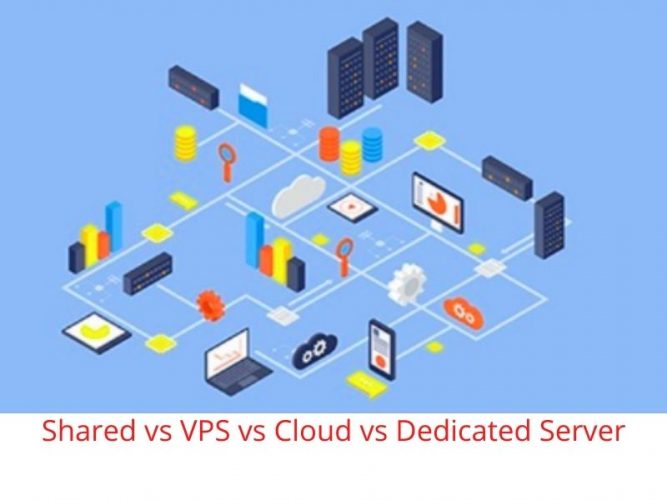To succeed in this ruthlessly competitive age, an impressive website is a must-have. A website is akin to your digital identity in several ways. To keep it up and running, you need a powerful hosting solution.
Over the years, the growth of technology has spawned many different kinds of hosting frameworks. The most popular ones include shared VPS, cloud, and dedicated hosting.
If you are new to technology, you may have a hard time choosing between them. Only with an in-depth understanding of these hosting types, you can make an informed decision. And that’s what we are about to discuss in this web hosting review post.
Shared Hosting
Shared hosting is the most basic type of hosting service. In this hosting model, a single physical server hosts a large number of clients-this may range from a few hundred to few thousand. Shared servers are a highly economical hosting option as the resources (CPU, RAM, and storage) get split among several different clients.
Although inexpensive, shared hosting does not guarantee a great website performance as a large number of clients draws on the same pool of server resources. So, when any of these clients face heavy traffic, your site’s performance can get negatively affected.
In many ways, shared hosting is similar to living with your roommates. While you may be able to save money, you may find yourself competing with them for resources like hot water or open space. So, if you have an entry-level website that draws little traffic and want to avoid the hassle of server management, a shared server is a great choice.
When choosing shared hosting for your needs, make sure you assess the long-term needs of your business. Shared servers have restrictions in terms of access to server resources. This can have a direct impact on things such as page load speed, web traffic sustainability, and so on.
So, if you expect your website to grow at a steady rate, you should consider a superior hosting solution (discussed below). This will ensure your website doesn’t face technical issues.
When to Choose Shared Hosting?
- You run an entry-level website or blog.
- You have no plans of scaling your site in near future.
- When you have budgetary constraints.
- You have a limited understanding of server management.
VPS Hosting
Like shared hosting, VPS Server hosting is an inexpensive hosting option that’s slightly more powerful than shared hosting. Even in VPS hosting, you share space with other clients on a physical server.
But there’s a remarkable difference-the host installs a virtual layer on the top of the server’s operating system. This layer partitions the server, allowing users to work with a fixed set of resources that they don’t need to share with others. This allows for faster page-loading speed, enhanced speed, and improved site performance.
A virtual private server also allows root access, which means you have increased control over the server settings you can install the OS and software of choice. This means a lot of customization and flexibility in terms of running your site.
Hosting on a managed VPS is equivalent to living in a condominium where you rent a flat in a large building. You don’t share living space or resources like hot water with others but remain subject to the resource limits of the building. So, you get ample hot water to use but cannot run your taps at full capacity. You will run out of hot water. In a VPS, you get ample resources to work with but still have restrictions in terms of how much you can consume.
When choosing a Linux VPS hosting server solution, make sure to choose a hosting provider that doesn’t oversell server space. For example, if a physical server handles 50 websites, most of which typically use around 50% of their server space, the service provider can oversell the space and host around 100 accounts on the same server. But if this is done, all the VPS accounts on the server can get affected during times of peak demand. To avoid such a situation, don’t go for a service provider that’s overcrowded.
When to Choose VPS Hosting?
- You run a website with low-to-moderate traffic
- When you want to invest in and expand your small website
- You expect moderately high traffic for your site in near future
Cloud Hosting
Cloud hosting is a relatively new form of hosting that has become immensely popular of late. These servers are immensely scalable and flexible and the key lies in how they are provisioned.
Here, instead of drawing resources from a single physical server, the website relies on a network of physical servers in different locations that collectively form a virtualized server, referred to as the ‘cloud’. The cloud is accessed remotely by means of the internet.
Because there are multiple servers involved, more resources are available for all clients. So, even if one of the physical servers constituting the cloud goes offline, the others keep your website up and running. As a result, the chances of an outage are minimized.
The distributed nature of cloud servers offers a great deal of scalability. This means you can scale your resources with the utmost ease. If you are looking to grow your site, a cloud service lets you add memory and processing power whenever required. When you have a physical server, you would need to buy new hardware to accommodate the growing needs of your website.
Like all other hosting models, the cloud also has certain drawbacks. Setting up and starting a cloud hosting solution isn’t easy, particularly for those with little technical knowledge. Plus, the cloud is quite expensive. If you choose to run your site on cloud servers, you may end up paying far more than what you actually need.
Furthermore, in a cloud model, you share server resources with other clients. So, you may face security issues similar to a shared hosting solution.
When to Choose Cloud Hosting?
- Your website has moderate-to-high monthly traffic and variable growth.
- You are well-versed with the nuances of server management.
Dedicated Hosting
Dedicated hosting is what it sounds like a physical server fully dedicated to a single customer/website. When you have an entire physical server at your disposal, it brings a lot of benefits in terms of speed, security, control, and customization. You have full control over the resources of the server. There are no websites to compete with yours for bandwidth, RAM, storage, or processing power. All this makes for a great user experience.
As there are no neighbors to speak of, you don’t risk sharing space with other potentially harmful websites. You have complete control over the hardware and software, so you can deploy the operating systems, frameworks, or other software without restrictions. This simply means a high level of customization for your website.
You can think of a dedicated server like having your own house. In the dedicated server, you are the only one residing there, so you can make whatever changes you want to. You not only have the entire space to yourself (there are no common areas) but also use all the resources as much as you like, with no restrictions. But you are eventually responsible for maintaining the property and keeping it in good working condition.
While dedicated servers offer a plethora of benefits, they come with a price tag. So, it is essential that you exercise due diligence when selecting a dedicated server for your business.
When to Choose Dedicated Hosting?
- You run a website with high monthly traffic and consistent performance needs.
- When you own a large business that demands a high level of security.
- You run an application that requires a high degree of customization.
Final Thoughts on Choosing the Right Hosting for your Website
While the marketplace offers a range of hosting options, finalizing one requires you to carry out adequate research. You need to carefully consider the current needs of your business, future scalability needs as well as the pros and cons of each hosting type. If you have just built your website, it’s good to start small with a shared hosting plan. As your website scales, you can always upgrade to a VPS, cloud, or dedicated server plan later.
Related Articles






Pingback: Getting Started with cPanel | Host4Geeks LLC